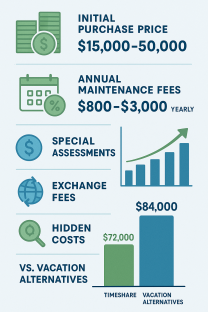You’ve probably seen those flashy vacation presentations promising you a slice of paradise for “basically nothing.”;
Maybe your parents got sucked into one of those timeshare pitches, or you’re genuinely curious about whether owning a vacation property could actually be worth it. Before you sign anything or hand over your hard-earned money, let’s break down everything you need to know about timeshare ownership in 2025.
This isn’t your typical boring financial advice â we’re talking straight facts, real costs, and whether this investment actually makes sense for your lifestyle and budget.
What Exactly Is Timeshare Ownership?
Timeshare ownership is essentially buying the right to use a vacation property for a specific period each year. Think of it like co-owning a vacation home with dozens of other people, where everyone gets their designated time slot. You’re not buying the actual property â you’re purchasing a share of time at that location.
There are several types of timeshare arrangements:
Fixed Week Timeshares: You own the same week every year at the same resort. This gives you consistency but zero flexibility.
Floating Week Timeshares: You can choose your week within a specific season, giving you more flexibility than fixed weeks.
Points-Based Systems: Instead of owning a specific week, you receive points annually that you can use to book stays at various properties within the timeshare network.
Fractional Ownership: You own a larger fraction of the property (typically 1/4 to 1/13) and get more usage time throughout the year.
The True Cost of Timeshare Ownership

Let’s talk numbers because the financial reality of timeshare ownership goes way beyond that initial purchase price they quote you during the sales presentation.
Initial Purchase Costs
The average timeshare purchase price in the United States ranges from $15,000 to $50,000, with luxury properties reaching $100,000 or more. However, this is just the beginning of your financial commitment.
Annual Maintenance Fees
Every timeshare owner must pay annual maintenance fees, which cover:
- Property upkeep and repairs
- Resort amenities maintenance
- Administrative costs
- Property management expenses
- Insurance and taxes
These fees typically range from $800 to $3,000 annually and increase every year. Over a 20-year period, you could pay $20,000 to $60,000 in maintenance fees alone.
Special Assessments
When major repairs or renovations are needed, timeshare owners may face special assessments â unexpected bills that can range from hundreds to thousands of dollars.
Exchange Fees
If you want to vacation somewhere other than your home resort, you’ll pay exchange fees ranging from $150 to $300 per transaction.
Hidden Costs and Fees
- Reservation fees: $25-$50 per booking
- Guest fees: $25-$100 for bringing non-owner guests
- Housekeeping fees: $50-$200 per stay
- Resort fees: $20-$50 per night
- Cancellation fees: $50-$150
- Transfer fees: $300-$1,000 when selling
Pros of Timeshare Ownership
Despite the costs, timeshare ownership does offer some legitimate benefits:
Guaranteed Vacation Accommodations
With a timeshare, you have guaranteed accommodations at your chosen resort during your ownership period. This eliminates the stress of finding available hotels during peak seasons.
Spacious Accommodations
Timeshare units typically offer more space than hotel rooms, including:
- Full kitchens or kitchenettes
- Separate bedrooms and living areas
- Washer and dryer facilities
- Private balconies or patios
Resort-Style Amenities
Many timeshare resorts provide extensive amenities such as:
- Swimming pools and water features
- Fitness centers and spas
- Golf courses and tennis courts
- Restaurants and bars
- Kids’ clubs and family activities
- Concierge services
Potential for Exchange Programs
Through exchange companies like RCI or Interval International, you can potentially vacation at different resorts worldwide, adding variety to your vacation experiences.
Fixed Vacation Costs
Once you’ve paid your initial purchase price, your annual maintenance fees provide relatively predictable vacation costs, protecting you from hotel price inflation.
Cons of Timeshare Ownership
The disadvantages of timeshare ownership often outweigh the benefits for most people:
Limited Flexibility
Timeshares lock you into vacationing at the same place or within the same network. This can become restrictive as your travel preferences change over time.
Difficult Resale Market
Timeshares are notoriously difficult to sell. The resale market is flooded with owners trying to exit their contracts, often selling for 10-20% of their original purchase price.
Ongoing Financial Obligations
Maintenance fees never go away and typically increase 3-5% annually. Even if you stop using your timeshare, you’re still responsible for these fees.
Limited Investment Value
Unlike real estate, timeshares rarely appreciate in value. They’re a lifestyle purchase, not an investment.
Booking Difficulties
Popular destinations and dates can be difficult to book, even within your own resort network. You may need to plan a year or more in advance.
High-Pressure Sales Tactics
The timeshare industry is known for aggressive sales presentations that can last several hours and employ high-pressure tactics to secure immediate purchases.
Types of Timeshare Ownership Structures
Understanding the different ownership structures is crucial for making an informed decision:
Deeded Ownership
With deeded ownership, you receive a legal deed for your timeshare, similar to owning real estate. This gives you:
- Property rights that can be sold, transferred, or inherited
- More legal protections
- Potential tax benefits in some cases
Right-to-Use Ownership
Right-to-use contracts give you the right to use the property for a specific period (typically 20-99 years) without actually owning real estate. These contracts:
- Eventually expire and revert to the developer
- Cannot be passed to heirs
- Offer fewer legal protections
Leasehold Ownership
Common in international destinations, leasehold ownership grants you use rights for a predetermined period, after which the property reverts to the original owner.
The Psychology Behind Timeshare Sales
Understanding the sales process can help you make a more rational decision:
The Vacation Mindset
Timeshare presentations often occur while you’re on vacation, when you’re relaxed and more susceptible to the appeal of returning to that same feeling annually.
Social Proof and Urgency
Sales presentations frequently use tactics like:
- “This offer expires today”;
- Testimonials from satisfied owners
- Claims about limited availability
- Pressure to “invest in your family’s future”;
Emotional vs. Financial Decision-Making
Sales teams focus on emotional benefits (family memories, stress relief) rather than financial realities, making it crucial to evaluate timeshares as financial decisions rather than emotional ones.
Alternatives to Traditional Timeshare Ownership
Before committing to a timeshare, consider these alternatives:
Vacation Rental Platforms
Services like Airbnb, VRBO, and HomeAway offer:
- Flexibility to choose different destinations
- No long-term financial commitments
- Often lower total costs
- Variety in accommodation types
Hotel Loyalty Programs
Premium hotel loyalty programs provide:
- Elite status benefits
- Room upgrades and amenities
- Flexible booking and cancellation
- Worldwide hotel networks
Vacation Clubs
Some resorts offer vacation clubs that provide:
- Access to multiple properties
- More flexible booking systems
- Lower upfront costs than timeshares
- Easier exit strategies
Travel Savings Accounts
Instead of timeshare ownership, consider:
- Setting aside money in a dedicated vacation fund
- Investing in index funds for vacation funding
- Using travel rewards credit cards
- Taking advantage of last-minute travel deals
Regional Considerations for US Buyers
Popular US Timeshare Destinations
Florida: Home to the highest concentration of timeshares, with popular areas including:
- Orlando (Disney World area)
- Miami and South Beach
- Key West and the Florida Keys
- Destin and Panama City Beach
Hawaii: Premium destination timeshares featuring:
- Maui and Oahu properties
- Higher purchase prices and maintenance fees
- Strong rental demand
- Strict regulations on timeshare sales
California: Coastal and mountain destinations including:
- San Diego and Orange County
- Lake Tahoe and Big Bear
- Napa Valley wine country
- Monterey and Carmel
Colorado: Mountain resort timeshares in:
- Vail and Aspen
- Breckenridge and Keystone
- Steamboat Springs
- Winter Park
State Regulations and Consumer Protections
Different states offer varying levels of consumer protection:
Rescission Periods: Most states provide 3-15 days to cancel a timeshare purchase without penalty.
Disclosure Requirements: States mandate specific information that must be provided to potential buyers.
Licensing Requirements: Sales agents must be licensed in many states.
Advertising Regulations: Restrictions on misleading advertising and promotional tactics.
How to Evaluate a Timeshare Opportunity
If you’re seriously considering a timeshare purchase, use this evaluation framework:
Financial Analysis
- Calculate Total Cost of Ownership:
- Initial purchase price
- 20-year maintenance fee projection
- Financing costs if applicable
- Exchange and booking fees
- Compare to Alternatives:
- Hotel costs for equivalent accommodations
- Vacation rental expenses
- Investment returns on the purchase amount
- Assess Your Usage Patterns:
- How often do you vacation?
- Do you prefer the same destination annually?
- Can you commit to using the timeshare regularly?
Due Diligence Steps
- Research the Developer:
- Financial stability and reputation
- Better Business Bureau rating
- Online reviews and complaints
- Legal actions or regulatory issues
- Review All Documentation:
- Purchase contract terms
- Maintenance fee history and projections
- Resort rules and regulations
- Exchange program details
- Visit During Your Intended Season:
- Experience the property during your planned usage period
- Assess crowd levels and amenities availability
- Evaluate the surrounding area
- Speak with Current Owners:
- Ask about their satisfaction levels
- Inquire about unexpected costs
- Learn about booking difficulties
- Understand their exit experiences
Timeshare Exit Strategies
If you already own a timeshare and want to exit, consider these options:
Selling on the Resale Market
Realistic Expectations: Expect to sell for 10-30% of your original purchase price.
Selling Platforms:
- RedWeek.com
- TimeshareUsers.org
- eBay timeshare auctions
- Local real estate agents specializing in timeshares
Tips for Selling:
- Price competitively based on recent sales
- Highlight unique features or prime weeks
- Be prepared for a lengthy selling process
- Avoid upfront fee resale companies
Giving Away Your Timeshare
Sometimes the best option is to give away your timeshare to avoid ongoing maintenance fees:
- Transfer to family members
- Donate to charity (limited tax benefits)
- Use timeshare transfer companies
- Post on timeshare forums
Timeshare Exit Companies
Be extremely cautious with exit companies that charge upfront fees. Many are scams. Legitimate options include:
- Wesley Financial Group
- Finn Law Group
- Newton Group Transfers
Deed Back Programs
Some resorts offer deed-back programs allowing you to return your timeshare to the developer, typically requiring:
- Current maintenance fees
- No outstanding loans
- Meeting specific criteria
Legal Considerations and Consumer Rights
Understanding Your Contract
Timeshare contracts are complex legal documents. Key elements include:
- Ownership structure and duration
- Usage rights and restrictions
- Maintenance fee obligations
- Transfer and inheritance provisions
- Termination conditions
Rescission Rights
Every state provides a “cooling off”; period (typically 3-15 days) during which you can cancel your timeshare purchase for a full refund.
Federal and State Protections
Interstate Land Sales Full Disclosure Act: Requires developers to provide detailed disclosure documents for properties sold across state lines.
State Consumer Protection Laws: Vary by state but generally include advertising restrictions, licensing requirements, and disclosure mandates.
Truth in Lending Act: Requires disclosure of financing terms and costs for timeshare purchases.
The Future of Timeshare Ownership
The timeshare industry is evolving to address changing consumer preferences:
Technology Integration
- Mobile apps for booking and management
- Virtual reality property tours
- Digital concierge services
- Enhanced online exchange platforms
Flexible Ownership Models
- Shorter-term contracts (5-10 years vs. perpetual)
- Points-based systems with broader networks
- Subscription-style vacation clubs
- Fractional ownership options
Sustainability Initiatives
- Eco-friendly resort development
- Carbon offset programs
- Sustainable tourism practices
- Green building certifications
Making the Final Decision
Before purchasing a timeshare, honestly answer these questions:
- Can you afford the total cost of ownership without financial strain?
- Will you realistically use the timeshare annually for the next 20+ years?
- Are you comfortable with limited flexibility in your vacation choices?
- Do you understand that this is a lifestyle purchase, not an investment?
- Have you compared the total costs to alternative vacation options?
Red Flags to Avoid
- High-pressure sales tactics requiring immediate decisions
- Claims about investment potential or guaranteed returns
- Upfront fees for resale or exit services
- Promises that seem too good to be true
- Reluctance to provide detailed cost breakdowns
Green Flags for Consideration
- Established, reputable resort developer
- Transparent cost disclosures
- Strong owner satisfaction ratings
- Flexible usage and exchange options
- Clear exit strategies
Expert Recommendations
Based on extensive analysis of the timeshare industry and consumer experiences, here are key recommendations:
For First-Time Buyers
- Take Your Time: Never purchase during your first presentation. Take time to research and consider.
- Calculate Total Costs: Include all fees and costs over a 20-year period before deciding.
- Consider Resale First: Look at resale timeshares before buying from developers.
- Visit Multiple Times: Experience the property during different seasons and times.
- Consult Professionals: Speak with a financial advisor and attorney before signing.
For Current Owners
- Maximize Usage: If you own a timeshare, use it regularly to justify the ongoing costs.
- Explore Exchanges: Take advantage of exchange programs to add variety.
- Budget for Increases: Plan for annual maintenance fee increases.
- Document Everything: Keep detailed records of all timeshare-related expenses.
- Plan Your Exit: Develop an exit strategy before you need it.
Conclusion: Is Timeshare Ownership Right for You?
Timeshare ownership can work for a small subset of travelers who:
- Take regular annual vacations
- Prefer familiar destinations and accommodations
- Can easily afford all associated costs
- Value convenience over flexibility
- Understand the long-term financial commitment
However, for most people, especially younger generations who value flexibility and experiences over possessions, timeshares represent a poor financial decision. The combination of high upfront costs, ongoing fees, limited flexibility, and poor resale value makes timeshares unsuitable for the majority of potential buyers.
Instead of timeshare ownership, consider building a dedicated vacation fund, using travel rewards programs, and maintaining the flexibility to explore new destinations and accommodation types. This approach typically provides better value, more experiences, and greater financial flexibility.
Remember, the best vacation investment is often the one that doesn’t lock you into a decades-long financial commitment. Your travel preferences, financial situation, and life circumstances will change over time â make sure your vacation strategy can adapt with you.
The key to smart vacation planning is maintaining flexibility while building memorable experiences. Whether that includes a timeshare depends entirely on your unique circumstances, but for most people, the answer is probably no.







